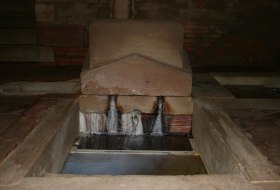
searchMenu


With the proceeds from the house at Aschaffenberg, Gutenberg's cousin Arnold Gelthus co-signed for the start-up financing of the printing workshop in Humbrechthof. Today, it is the oldest half-timbered house in Mainz, located in the picturesque Kirschgarten - right in the heart of the charming old town.


Hinkelstein Since the 14th century, a Hinkelstein is mentioned here. The original stone is most likely installed in the drywall. The current stone was erected in 2004 and comes from a foundations excavated during canal works in Osthofen, next to which bricks of Roman origin were found. Height: 188 District: "Am Hinkelstein" History / Stories / Anecdotes: Since about 1300 a Hinkelstein was mentioned here. Approximately In 1890 it was demolished according to the Monzernheimer chronicler, teacher Georg Wendel.…

The parish church in Gabsheim is one of the oldest and most beautiful churches in Rheinhessen. Its dominant position above the village makes it a striking landmark for the entire surrounding area. The Gothic church on the edge of the village, which appears uniform from the outside, surprises with its magnificent interior. The single-nave nave, built around 1490, was converted into a hall between 1510 and 1518. The relatively short space, divided by four pillars and consisting of three naves of equal height, is spanned by a refined net…

The former Frei-Weinheim marketplace was not built on until the 18th century. Between 1700 and 1772, the weekly fruit market was held here on Tuesdays. Nikolaus Schaurer and his descendants operated a flourishing timber trade here from the 19th century. His father had already been a tenant of the Electoral Palatinate timber yard. The timber trade had a long tradition in Frei-Weinheim. Documented since the 15th century, rafts landed regularly, mainly from the Black Forest, the Vosges and the Spessart. Wood was the most important import…

The Carnival Fountain (Fastnachtsbrunnen) is almost nine meters high. It was completed in 1967 and illustrates over 200 bronze figures, including Till Eulenspiegel, Father Rhine, and Hans Wurst, which embody the spirit and myth of Mainz Carnival. Of course, there is also the famous "Weck, Worscht und Woi," which is cherished by the people of Mainz. The fountain is located in Schillerplatz. On November 11th, the great figures of Mainz Carnival gather on the balcony of the Osteiner Hof, which overlooks the square, to officially open the…

The Sironabad in Nierstein was a former Roman bathhouse with two sulfur springs and two freshwater springs. The springs led to early settlements, as finds from Celtic, early Germanic, and Roman times clearly prove. The sulfur spring of the Sironabad was rediscovered in 1802 after being buried for centuries. During cleanup work, copper coins dated 87 to 267 AD and small figurines were found in stone basins surrounded by plaster balls. These finds prove beyond doubt that the fountain was in operation during this period and was used by the…

Local Fortifications 3.0 Innovative Building Research in Ingelheim Virtual exhibition on the town fortifications of Ober-Ingelheim and Großwinternheim The virtual exhibition Ortsbefestigung 3.0, Innovative Bauforschung in Ingelheim will be available on the website www.ortsbefestigung3punkt0.de from 30.09.2020! In the form of a 360° tour of the castle church, you will be informed on the one hand about two- and three-dimensional building survey methods, and on the other hand about new discoveries at the local fortifications…